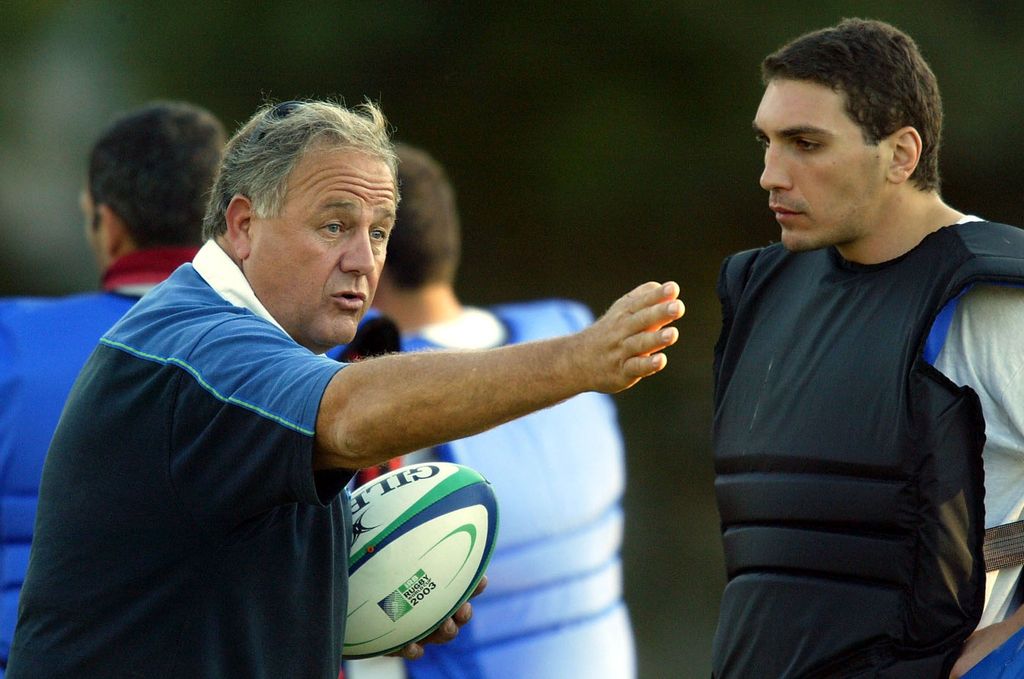As a former coach of Tunisia and Morocco, Frenchman Claude Saurel is well-versed in helping smaller rugby-playing nations get their share of the spotlight. However, it is for his work in transforming Georgia, from relative minnows into a burgeoning rugby power, that the 71-year-old is best known.
Saurel was head coach when the Lelos qualified for their first Rugby World Cup, in Australia in 2003, the tournament that helped launched what can only be described as a rugby revolution in Georgia.
Now the national sport, rugby is played the length and breadth of the country with dedicated stadia and other infrastructure in place to support the passion the Georgian people have for the game.
It is all a far cry though from the mid-1990s when Saurel first arrived as a rugby consultant to find a country struggling to get back on its feet after a damaging civil war.
“There was electricity three, four hours a day. For the rest of the time, everything was done in the dark. It was exceptional. In the roads of Tbilisi you could hear the generators turning to make electricity,” recalled Saurel, who twice led his hometown club team Béziers to national titles.
“I had a bodyguard who protected me every day because it was very dangerous with the number of hostages and demands for ransoms.”
Seeing the potential
Saurel, a winemaker by trade, must have questioned his wisdom in swapping the vineyards of the Languedoc region of France for the then mean streets of Tbilisi. But having seen the potential at first hand, Saurel wasn’t about to turn his back on Georgian rugby.
“At that time even the players wore hoods and carried revolvers, it was a very dangerous period. But when I saw these players and saw them on the pitch. When I saw their trainers’ passion and everybody else’s, when I saw the country, when I saw these strong, intelligent men, I told myself I couldn’t abandon them.
“And so, I decided to help them. Clearly, the first thing they told me was, ‘but mister, we have no money.’ I told them, well, we’ll see afterwards!”
It quickly became clear to Saurel that for rugby to progress in Georgia, he would have to take the country’s best players elsewhere to train and develop.
“All the stadiums had been taken over by the military and the pitches were destroyed, the stands were in an awful state, everything was stolen – the taps, the lightbulbs, the pipes, the goalposts ... everything was scavenged so it was in a deplorable state,” he explained.
“I held training sessions in the public gardens because it was the only place that had a bit of grass and where we could learn how to tackle and to work on technique.
“The boys had awful shoes, no rugby balls, there was nothing. So, we had to restructure it; I had international players who were going hungry.
French renaissance
“How can you make a rugby player play if they are hungry and they don’t eat correctly? It was not right. With the consent of the Georgian leaders, we decided to take these players to France, to train in organised clubs, on proper pitches, with the right equipment.
“I was able to take 80 players and these players immersed themselves into French rugby.
“Georgians are very patriotic people and so leaving the country was a sacrifice. But it helped Georgian rugby evolve, and the progression was rapid.”
So much so, they defied the odds and the paucity of resources to qualify for their first Rugby World Cup with only 13 years of international experience behind them.
A 17-13 win against Russia in front of 50,000 partisan fans in Tbilisi, saw them take their place alongside the likes of England and South Africa in Pool C.
“It was very important for the Georgians to show that they could rival them (Russia). Still today, it is the only sport where they dominate the Russians. They have never lost against Russia since 2001, never.
“When they qualified for the World Cup it was an extraordinary moment for them," said Saurel, who went on to coach Russia following his stint with the Lelos.
Georgia’s tournament debut came against eventual champions England, an 84-6 defeat in Perth.
Suffering at the hands of England
“It’s still carved in my memory, I suffered the entire game,” admitted Saurel. “I knew they could have done a lot better than they did that day.
“In that instance, I didn’t succeed but, against South Africa, we were in front during the game and for one hour we were dominating, it was extraordinary. Of course, we lost in the end.”
Saurel decided to call it a day at the end of the tournament, leaving the team in a much better place than when he found it.
“They were ranked 38th of 42 European rugby-playing nations and are now the number one team in Europe outside of the Six Nations.”
Seeing how Georgian rugby has progressed, on and off the field, makes Saurel very proud.
“It’s the only country in the world where, within the space of five or six years, 21 new stadiums have been created. They are everywhere. Not small stadiums, stadiums with stands of two-10 thousand, with gym installations. One has an academy next to it, for coaches, for referees and for the development of rugby.
“The rugby schools are full, and I know of one club where 800 children are involved.
“Today, they have 80 qualified trainers and 35 qualified referees.
“Yet Georgian rugby is still in its infancy, it is still developing which is absolutely extraordinary.”
